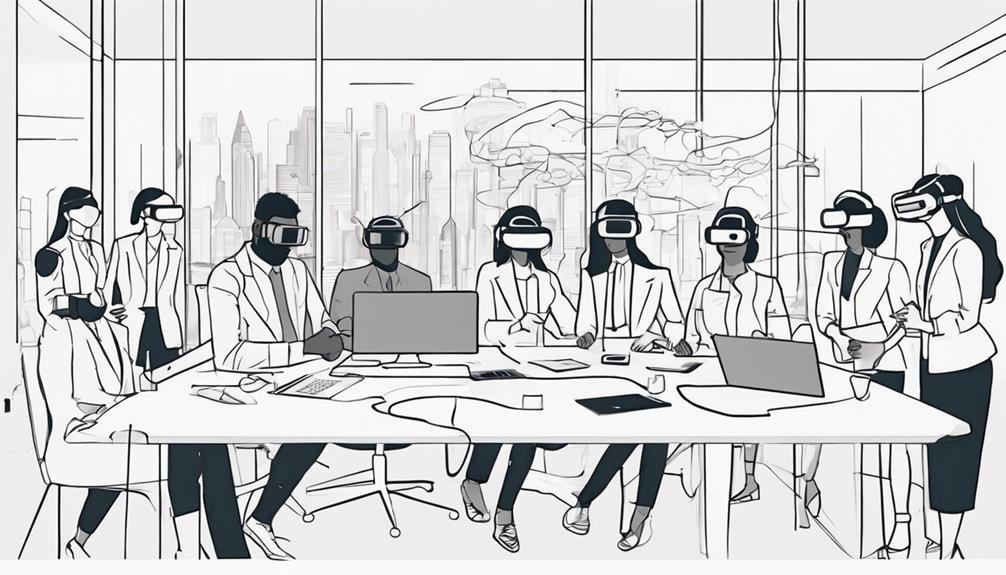Embrace the future by honing key skills like analytical thinking, active learning, and adaptability. These essential traits will empower you to thrive in the ever-evolving work landscape. As organizations navigate global transformations, staying competitive means developing problem-solving abilities, embracing self-management skills, and enhancing social capabilities. The demand for complex decision-making, continuous upskilling, and innovative problem-solving is on the rise. By mastering these core competencies, you'll not only navigate the challenges of tomorrow but also excel in a dynamic and competitive job market. Access your potential by cultivating these essential skills for the future.
Key Takeaways
- Analytical Thinking for data-driven decision-making.
- Continuous Learning to adapt to changes.
- Complex Problem-Solving to tackle challenges.
- Reskilling and upskilling for competitiveness.
- Adaptability and innovation in a dynamic environment.
Future Skills Importance and Drivers

The landscape of work is rapidly evolving, driven by technological advancements and global transformations. In this dynamic environment, the importance of future skills cannot be overstated. Organizations are recognizing the need to upskill and reskill their workforce to stay ahead in the ever-changing market. The World Economic Forum's Future of Jobs Report highlights the urgency, aiming to reskill one billion individuals by 2030 to bridge the skills gap identified by 87% of executives and HR managers.
In-Demand Skills of 2025
With the fast-evolving nature of the work landscape, driven by technological advancements and global shifts, the demand for new core skills by 2025 is undeniable. The in-demand skills of 2025 are essential for navigating the future labor market:
- Analytical Thinking: Embracing data-driven decision-making and problem-solving will be vital to thrive in the era of digital transformation.
- Active Learning: The ability to continuously upskill and adapt to new technologies and methodologies will be a key differentiator in the workplace.
- Complex Problem-Solving: Tackling intricate challenges with creativity and resilience will set you apart in a world where solutions are not always straightforward.
The skills gap identified by executives and HR managers underscores the urgency to reskill and prepare for emerging business models and workplace transformations. By honing these in-demand skills, you will be well-equipped to succeed in a rapidly changing work environment where adaptability and innovation reign supreme.
Problem-Solving Skills Category

Amidst the dynamic landscape of the future, problem-solving skills stand as the cornerstone of success. Being adept at analytical thinking, critical thinking, creativity, reasoning, and developing innovative solutions is crucial. These skills empower you to adapt to new challenges, find solutions, and overcome obstacles effectively. In a rapidly evolving work environment, the ability to engage in complex problem-solving is paramount for driving progress and achieving goals. Employers highly value individuals who can think critically and come up with creative solutions to address issues efficiently.
| Problem-Solving Skills | Benefits |
|---|---|
| Analytical Thinking | Identify issues |
| Critical Thinking | Make informed decisions |
| Creativity | Innovate and excel |
Self-Management Skills Category
Embracing the ever-evolving landscape of the future demands a proactive approach to cultivating essential self-management skills. In this dynamic environment, honing resilience, stress tolerance, and flexibility is crucial for adapting to changing work environments. Active learning and strategic approaches are essential for continuous personal and professional growth. Leadership and social influence skills play a pivotal role in self-management, enabling individuals to lead teams and navigate complex social dynamics effectively. Additionally, mastering technology use, monitoring, and control skills is vital in the digital age, empowering individuals to stay on top of their tasks and responsibilities. Moreover, expertise in technology design and programming is increasingly important for those engaged in technology-driven tasks, providing a solid foundation for effective self-management in this domain. By developing these multifaceted self-management skills, you can confidently navigate the challenges and opportunities that lie ahead, embracing a future full of possibilities.
Social Skills Category

Fostering social skills is crucial in preparing for the future landscape of work. In the evolving world of employment, possessing strong leadership abilities and social influence is essential. Resilience, stress tolerance, and flexibility are not just buzzwords but critical aspects of the social skills category, enabling individuals to adapt to rapidly changing work environments. Furthermore, the capacity for critical thinking and analysis within the domain of social skills is fundamental for effective problem-solving and decision-making.
Creativity, often undervalued, along with originality and initiative, are indispensable social skills needed to foster innovation and drive positive change in the workplace. Reasoning, problem-solving, and ideation are also essential components of the social skills category, facilitating the generation of new ideas and the resolution of complex problems. By honing these social skills, you equip yourself with the tools necessary to thrive in the future job market where adaptability, creativity, and critical thinking reign supreme.